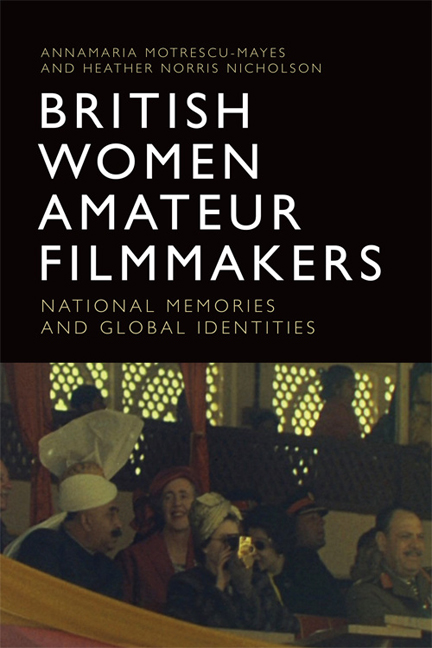Book contents
- Frontmatter
- Contents
- List of Figures
- List of Sources and Abbreviations
- Acknowledgements
- Foreword
- 1 Amateur Women Filmmakers as Producers of Cultural Meaning
- 2 Webs of Production and Practice
- 3 Resisting Colonial Gendering while Domesticating the Empire
- 4 Cameras Not Handbags: The Essential Accessory
- 5 Through Women's Lens: Imperial and Postcolonial Class and Gender Hierarchies
- 6 Teacher Filmmakers
- 7 British Women's Media Narratives of Gender and Collective Memory
- 8 Reimagining Boundaries: Amateur Animations
- Afterword
- Selected Bibliography
- Index
Foreword
Published online by Cambridge University Press: 12 November 2019
- Frontmatter
- Contents
- List of Figures
- List of Sources and Abbreviations
- Acknowledgements
- Foreword
- 1 Amateur Women Filmmakers as Producers of Cultural Meaning
- 2 Webs of Production and Practice
- 3 Resisting Colonial Gendering while Domesticating the Empire
- 4 Cameras Not Handbags: The Essential Accessory
- 5 Through Women's Lens: Imperial and Postcolonial Class and Gender Hierarchies
- 6 Teacher Filmmakers
- 7 British Women's Media Narratives of Gender and Collective Memory
- 8 Reimagining Boundaries: Amateur Animations
- Afterword
- Selected Bibliography
- Index
Summary
This volume, exploring the diversity of women's amateur filmmaking from the cine camera's early days to the digital and online present, is highly welcome. Not only do its authors, Annamaria Motrescu-Mayes and Heather Norris Nicholson, bring into public view a whole body of little-known and rarely considered films by British women, in addressing the status of the amateur and the nature of their work, they open new channels between women and cinema, enlarging understanding of film as a way of gendered, class and colonial imagining, and offering a new lens through which to investigate the interactions between media use and the lived experience of social change. Hopefully, disseminating knowledge of women's past and present amateur filmmaking will encourage archives to preserve such work and exhibition venues to make it more accessible to wider audiences.
Central to the book's project is the light it throws on the nature of the amateur space. While often relegated as the naïve hobby of home-movie making, the authors reveal a potentially freer space, less bound by industry know-how and conventional ways of doing things. Some of the women investigated took up the camera at a time when filmmaking itself was still a new form and developing its own professional protocols. Equally, during the interwar years Britain was undergoing huge changes, not only in terms of gender and class relations, but, as the authors emphasise, through the incipient dissolution of empire and the rise of anti-colonial struggles. While cost meant that early women amateurs usually came from the middle classes, their position as women on the margins of key administrative, political and industrial arenas, whether abroad or at home, gave their status as amateurs a degree of openness and flexibility not available to professional documentarists – answerable to funding agencies – or to feature film producers, driven by economic constraints, competition with Hollywood or subject to censorship.
This does not, however, mean that British women amateurs occupied an empty space of free expression. Along with perceptions derived from their own class and familial positions, their approach to the evolving languages of film necessarily drew on practices of mainstream movie making, and, as the authors find, the British Empire movie could haunt their filmmakers’ imaginations.
- Type
- Chapter
- Information
- British Women Amateur FilmmakersNational Memories and Global Identities, pp. xii - xivPublisher: Edinburgh University PressPrint publication year: 2018



